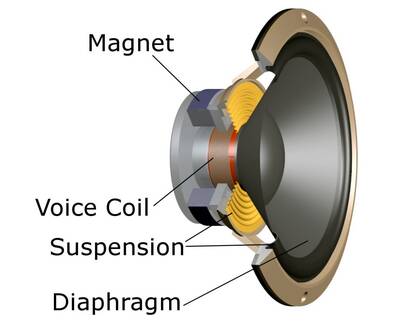
After writing an article on how bass can damage headphones, I received many emails about whether the same phenomenon holds true for speakers. So, I did some research specifically on speakers to find out if bass can damage speakers. And here is what I found.
Too much bass can cause the speaker cones to move excessively beyond its limits — a situation known as over excursion. Over time the cones will deform and eventually break. Also, an extremely loud bass can easily damage midrange speakers because they are not designed to play low frequencies.
I’ll cover, in detail, how bass can damage a speaker and the effect bass boost has on speakers. We’ll later take a look at some other factors that can damage a speaker besides bass. To help you fully understand this concept, let’s discuss briefly how a speaker works.
Table of Contents
How a Speaker Works
Explaining how a speaker works can get very technical and geeky, so this section aims to make it as simple as possible for everyone to get a brief idea of how it works.
Speakers are devices that receive electrical signals from an amplifier and then convert that into sound. But how does it do that?
There is a component in a speaker known as the voice coil. Voice coil is essentially a wire, usually aluminum or copper, that is coiled. This coil is placed in between the speaker’s permanent magnets and attached to the speaker cone and frame (or diaphragm), just as you see in the image above, and you will know why in a moment.

When an amp is connected to the speaker, it sends an electrical signal (current) to the voice coil, and if you know a little about electricity, an electrically charged coil becomes a magnet. Essentially, the electrical current sent to the voice coil converts the coil into a magnet. The higher the current, the stronger the voice coil’s magnetic strength (keep this in mind).
Once the voice coil becomes a magnet, it is either attracted or repelled by the speaker’s permanent magnet. The attraction and repulsion of the voice coil and permanent magnets cause the voice coil to move back and forth.
As it moves back and forth, the voice coil pushes the speaker cones, and that, in turn, pushes air to create sound waves.
Now that we have a primer on how speakers work, let’s talk about how bass can damage speakers.
How can Bass Damage Speakers?
At the same volume level, low audio frequencies are harder to hear compared to mid and high frequencies. That’s simply because of the human hearing range. Our ears tend to pick up mid and higher frequencies much easier than the low frequencies.
In order to hear both the low, mid, and high frequencies at an equal volume, amplifiers are designed to play bass at a much higher volume compared to the mids and highs. But how does it do it?
Amps supply a higher electrical current to the speaker’s voice coil to play low bass frequencies. And as I explained earlier, the higher the electrical current, the stronger the voice coil’s magnetic field becomes. The stronger the voice coil’s magnetic field, the more intense the speaker cone’s moves. The farther and more intense the speaker cone’s move, the louder the sound it produces.
I am sure you have probably noticed how intense the speaker cones move when playing bass. Yes, that’s because it has to play the bass much louder before it can be at equal volume with the mids and highs.
Now, this is for my technical and geeky audience:
For each octave down (or half a frequency), the cone of a speaker has to move four times as much to match up with the set volume.
For instance, if a speaker cone moves 1 inch to play 200Hz at 4dB, the cone has to move 4 inches (four times) to play 100Hz at the same 4dB. For a 50Hz signal, the cone has to move 8 inches to match the 4dB volume.
But here is the caveat:
There is a limit to how far the cone of a speaker can move. In audio engineering, this is known as the speaker excursion limit. When this limit is exceeded, the voice coil will either slip out of the permanent magnet or hit its bottom. This situation is known as over excursion.
Too much bass can cause over excursion. But how?
A loud bass signal will cause an amplifier to send a very high electrical current (audio signal) to the voice coils. And as the voice coil gets overly charged, it will travel much farther than its limits. Once the voice coil or speaker cone goes beyond its limits, it will slip out of the permanent magnet or bottom out, and that will break (or blow) the speakers.
Bass can damage midrange speakers even faster. That’s because midrange speakers have a low speaker excursion limit, which means the speaker cone can’t travel far enough before it damages. It’s just not a good idea to play bass-heavy music very loud through a midrange speaker. They will easily blow.
For musicians, this is the reason why you should never play bass guitar through a guitar amp. The low frequencies of the bass guitar will push the cone of the guitar amp cabinet beyond its excursion limit and break it in no time.
Can Bass Boost Damage Speakers?
Perhaps the bass in the music you are listening to just isn’t heavy enough to be enjoyable, or you are generally inclined to boosting the bass all the time. Whatever the reason, you have probably wondered before if boosting the bass is something you should do. Can bass boost damage speakers?
Bass boost cannot do any harm to most speakers. Speakers can handle an extra bass without any damage. However, at a high Sound Pressure Level (SPL) or at extremely high volume, boosting the bass can easily damage the speakers.
When the bass is boosted, and your volume is very high, that will definitely take a toll on the cone of the speaker.
As a rule of thumb, anytime you think of boosting the bass, you should think of the overall volume and how loud the speakers are playing. If you think it’s very loud, reduce it before you boost the bass. Else you stand a risk of blowing it.
Other Factors that Can Damage Speakers
There are several other factors that can break a speaker beside a loud bass. You need to know about them if you want to keep your speakers in good condition for years to come. So let’s get into it.
1. Amp Overpowering Speakers
If you own a speaker with an amplifier built into it (active speaker), this may not be a problem. That’s because active speaker manufacturers ensure that they match the right amp with the speaker.
Connecting a too-powerful amplifier to your passive speakers can easily damage it. But why is it so?
An overpowered amplifier will send a much higher current to the speakers than it can handle. This will drive the speaker cones beyond its limits (over excursion), causing distortion in the signal, and eventually break the speakers. Simultaneously, the power supplied by an overpowered amp will cause the speaker’s voice coil to heat up quickly and burn.
This is why finding the right amplifier for your speakers is a crucial step to take. Read this guide on how to match speakers and amplifiers to find the perfect amp for your speakers.
2. Amp Underpowering Speakers
Just as an overpowered amp can damage speakers, an underpowered speaker can also damage speakers.
But what is an underpowered amp?
This is essentially an amplifier that is not powerful enough to power a speaker. Here is what happens when you connect a speaker that is too powerful for an amplifier.
In an attempt to send adequate power to the speakers, an underpowered amp will send a clipped (or distorted) signal to the speaker. Sending a distorted signal to a speaker will only result in its damage after a while.
So, just as I mentioned earlier, learn how to match speakers with an amplifier in order to find the right amp powerful enough to drive your speakers.
3. Moisture Damage
As with any other electrical/electronic device, speakers are susceptible to water damage. If your speakers are exposed to dampness, water, or any moisture-related elements, in no time, it will break.
Make sure you keep your speakers in a dry, moisture-free location if you want to use it for a long time.
Conclusion
In summary, playing a loud bass through speakers will damage the speaker cones and render them useless. Always remember to turn down the volume of loud music when you want to boost the bass; else, you risk blowing the speakers.
Besides bass, other factors such as an overpowered and underpowered amp, as well as exposure to moisture can damage your speakers. So ensure you match the speakers with the right amplifier and keep your speakers dry at all times.

Hi, I’m Raymond. A keyboard player, music producer, and writer. And I’m also the founder of this blog. As someone who has been working with several audio and music equipment and different musicians for many years, my goal is to answer all your questions on music and equipment, as well as the latest music software and technology. For more info, check out my about me page
